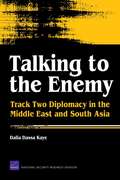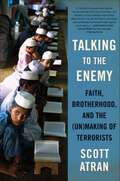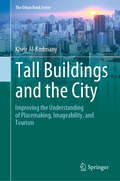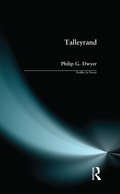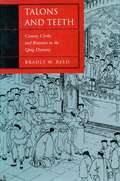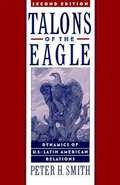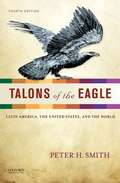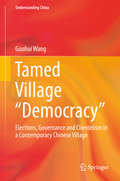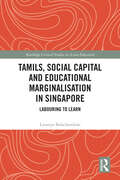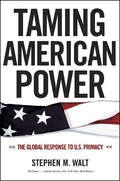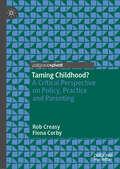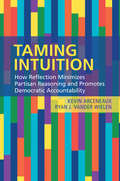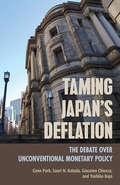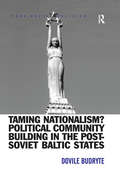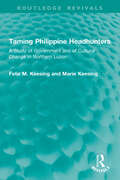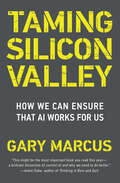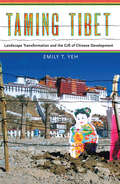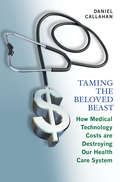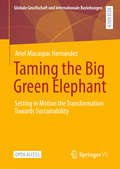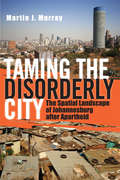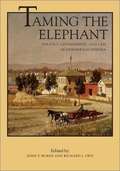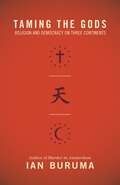- Table View
- List View
Talking to the Enemy
by Dalia Dassa KayeThis monograph examines security-related track two diplomacy efforts in the Middle East and South Asia, including how such efforts have socialized participants into thinking about security in more cooperative terms, and whether the ideas generated in track two forums have been acknowledged at the societal level or influenced official policy. Kaye concludes with suggestions on how to improve future track two efforts.
Talking to the Enemy: Faith, Brotherhood, and the (Un)Making of Terrorists
by Scott Atran“Atran explores the way terrorists think of themselves and teaches us, at last, intelligent ways to think about terrorists.”—Christopher Dickey, Newsweek Middle East Editor and author of Securing the CityTalking to the Enemy by Scott Atran is an eye-opening and important book that offers readers a startling look deep inside terror groups. Based on the author’s unprecedented access to and in-depth interviews with terrorists and jihadis—including Al Qaeda, Hamas, and Taliban extremists, as well as members of other radical Islamic terror organizations—Talking to the Enemy provides fresh insight and unexpected answers to why there are people in this world willing to kill and die for a cause. A riveting, compelling work in the tradition of The Looming Tower and Terror in the Name of God, Talking to the Enemy is required reading for anyone interested in making the world a safer, more secure place for everyone.
Tall Buildings and the City: Improving the Understanding of Placemaking, Imageability, and Tourism (The Urban Book Series)
by Kheir Al-KodmanyThe chaotic proliferation of skyscrapers in many cities around the world is contributing to a decline in placemaking. This book examines the role of skyscrapers and open spaces in promoting placemaking in the city of Chicago. Chicago’s skyscrapers tell an epic story of transformative architectural design, innovative engineering solutions, and bold entrepreneurial spirit. The city’s public plazas and open spaces attract visitors, breathe life, and bring balance into the cityscape. Using locational data from social media platforms, including Twitter, Facebook, and Instagram, along with imagery from Google Earth, fieldwork, direct observations, in-depth surveys, and the combined insights from architectural and urban design literature, this study reveals the roles that socio-spatial clusters of skyscrapers, public spaces, architecture, and artwork play to enhance placemaking in Chicago. The study illustrates how Chicago, as the birthplace of skyscrapers, remains a leading city in tall building integration and innovation. Focusing on some of the finest urban places in America, including the Chicago River, the Magnificent Mile, and the Chicago Loop, the book offers meaningful architectural and urban design lessons that are transferable to emerging skyscraper cities around the globe.
Talleyrand: A Bibliography (Profiles In Power #Vol. 4)
by Philip G. DwyerFrom church establishment figure to revolutionary, supporter of Napoleon Bonaparte to promoter of the Bourbon Restoration, the twists and turns of Charles Maurice Prince de Talleyrand’s remarkable career through one of the most turbulent periods of French and European history continue to fascinate. Witty and wiley, cynical and charming, Talleyrand has been portrayed as a cynical opportunist, hypocrite, and traitor who betrayed governments whenever he had a chance to do so. Yet as the representative of France and advocate of peace at the Congress of Vienna, he has also been cast as the saviour of Europe. Philip Dwyer offers a detached, more nuanced analysis of the role of Talleyrand in the corridors of power over five different French regimes. He presents Talleyrand as a pragmatist, a member of the French political elite, mediating between various political interests and ideological tendencies to produce a working compromise, rather than actively seeking the overthrow of governments. His ability to weather the tectonic shifts in French and European politics of the time, and to successfully attach himself to the prevalent political trend, ensured that his role as French statesman was long and productive.
Talons and Teeth: County Clerks and Runners in the Qing Dynasty (Law, Society, and Culture in China)
by Bradly W. ReedFor commoners in the Qing dynasty, the most salient agents of the imperial state were not the emperor's appointed officials but rather the clerks and runners of the county yamen, the lowest level of functionaries in the Qing state's administrative hierarchy. Yet until now we have known very little about these critically important persons beyond the caricatured portrayals of corruption and venality left by Qing high officials and elites. Drawing from the rich archival records of Ba county, Sichuan, the author challenges the simplicity of these portrayals by taking us inside the county yamen to provide the first detailed look at local administrative practice from the perspective of those who actually carried it out. Who were the county clerks and runners? How were they recruited, organized, disciplined, and rewarded? What was the economic basis for a career in the yamen? How did clerks and runners view themselves as well as legitimize their role in Qing government? And what impact did their interests and practices have on symbolically laden elements of imperial government such as the magistrate's court? In addressing these questions, the author traverses the disjuncture between statutory regulations and the realities of daily administrative practice, uncovering a realm of informal, semiautonomous, yet highly structured and even rationalized procedures. Although frequently in violation of formal law, this extra-statutory system nevertheless remained an irreducible component of local government under the Qing. Recognizing the centrality of such informal practice to yamen administration forces us to rethink not only traditional assumptions concerning local corruption in the Qing, but also the ways in which we conceptualize the boundaries between state and society in late imperial China.
Talons of the Eagle: Dynamics of U.S.-Latin American Relations, Second Edition
by Peter H. SmithSpanning almost two hundred years, Talons of the Eagle tells the turbulent story of U.S.-Latin American relations from the birth of the United States and the new Latin American nations through the Cold War to the present day.
Talons of the Eagle: Latin America, the United States, and the World (Fourth Edition)
by Peter H. SmithTopical and up to date, Talons of the Eagle: Latin America, the United States, and the World, Fourth Edition, presents an eminent scholar's perspective on the interaction between global trends and inter-American affairs--a subject that has become crucially important in the current era. Rather than concentrating solely on U. S. policy, Peter H. Smith uniquely addresses the structural relationships between the two regions by focusing on international systems, the distribution of power, and the perception and pursuit of national interests. Throughout, this provocative text casts light on such contemporary issues as economic integration, drug trafficking, undocumented migration, and the rise of Latin America's "new left. " It also analyzes Latin American reactions and responses to the U. S. --and to the rest of the world--in these complex and troubling times.
Tamed Village "Democracy"
by Guohui WangWang's book offers an empirically rich and conceptually nuanced analysis of how local state agents maintain control over village self-governance in China. His careful analysis of primary documents enables him to explicate the formal mechanisms used by members of the local state to influence village affairs. Meanwhile, his rigorous and fascinating ethnographic data enable him to elucidate the manifold ways in which informal clientelist ties between local state officials and village elites permit the former to exert control. Overall, this excellent book powerfully demonstrates the need for scholars to go beyond attention to election processes when evaluating what village democracy means in a Chinese context. It is a must-read for all serious scholars of Chinese politics and society. --Rachel Murphy, University of Oxford Guohui Wang's highly original, in-depth case research vividly reveals the dynamics of contemporary Chinese village politics. By combining abundant empirical data with close observation as an "insider," his book illustrates the processes and consequences of transplanting 'democracy' into rural Chinese society. Particularly for those in the West who are keen on understanding the ongoing transformation of rural China, this book is a rich and revealing source. --Shukai Zhao, Development Research Center of the State Council, P. R. China
Tamil Standard 7 - Second Term - TamilNadu Board
by Tamil Nadu GovernmentStandard 7 Tamil Medium,Second Term sylabus for the subject Tamil.
Tamils, Social Capital and Educational Marginalization in Singapore: Labouring to Learn (Routledge Critical Studies in Asian Education)
by Lavanya BalachandranLabouring to Learn examines academic mobility pathways among ethnic minority Tamil youths in public secondary schools and vocational institutions in Singapore. The book qualitatively examines the interactive effects of race and class on the educational performance of Tamil youths through the lens of social capital. Despite their numerically majoritarian position within the Indian population in Singapore, the foreclosed access for Tamils to diverse class networks within the ethnic community as well as limited inter-ethnic interactions has historically truncated the means to resources and opportunities for social mobility. In schools, the narratives of Tamil boys and girls from the weaker academic streams and economically disadvantaged backgrounds reveal that they typically experience exclusion on account of racial, economic and academic marginalization in their everyday lives. Turning to bonding ties among peers and family members provide social support resources that offer some respite from marginalization. On the flipside, articulations of resistance ensue among Tamil youths that tangibly take time away from learning on one hand, but on the other, runs the danger of empowering the cultural deficit rhetoric for mainstream society to explain poor academic performance among ethnic minorities. The account of educational marginalization amongst Singaporean Tamil youths contributes towards understanding social inequality in a non-liberal multicultural context where marginalization is differentially experienced across ethnic minority groups and traced to broader socio-historical contexts of migration, assimilation and minority-majority relations. Furthermore, it also articulates the utility of a social capital framework in historically revealing how educational inequality emerged and continues to be sustained in a postcolonial context.
Taming American Power: The Global Response to U. S. Primacy
by Stephen M. WaltFinalist for the 2006 Gelber Prize: "A brilliant contribution to the American foreign policy debate."—Anatol Lieven, New York Times Book Review At a time when America's dominance abroad was being tested like never before, Taming American Power provided for the first time a "rigorous critique of current U.S. strategy" (Washington Post Book World) from the vantage point of its fiercest opponents. Stephen M. Walt examines America's place as the world's singular superpower and the strategies that rival states have devised to counter it. Hailed as a "landmark book" by Foreign Affairs, Taming American Power makes the case that this ever-increasing tide of opposition not only could threaten America's ability to achieve its foreign policy goals today but also may undermine its dominant position in years to come.
Taming Babel
by Rachel Leow"Taming Babel sheds new light on the role of language in the making of modern postcolonial Asian nations. Focusing on one of the most linguistically diverse territories in the British Empire, Rachel Leow explores the profound anxieties generated by a century of struggles to govern the polyglot subjects of British Malaya and postcolonial Malaysia. The book ranges across a series of key moments in the nineteenth and twentieth centuries, in which British and Asian actors wrought quiet battles in the realm of language: in textbooks and language classrooms; in dictionaries, grammars and orthographies; in propaganda and psychological warfare; and in the very planning of language itself. Every attempt to tame Chinese and Malay languages resulted in failures of translation, competence, and governance, exposing both the deep fragility of a monoglot state in polyglot milieux, and the essential untameable nature of languages in motion"--
Taming Childhood?: A Critical Perspective on Policy, Practice and Parenting
by Rob Creasy Fiona CorbyThis book explores the links between recent reports of increasing levels of unhappiness and mental health problems amongst children and young people, and changes within childhood which restrict and reduce opportunities for children to develop and maintain resilience. Although in academic terms children may be viewed as beings, Creasy and Corby posit that there is much to suggest that for parents, practitioners and policy-makers, children are primarily seen as becomings. The book argues that viewing children as becomings, together with the idea that childhood is fraught with danger, contributes to practices and policies which can be seen as making childhood tame. This taming of childhood leads to an impoverished childhood that does not provide the space that children need to grow and develop. Furthermore, Taming Childhood? challenges the idea that young adults are 'snowflakes', unable to cope with everyday pressures. Students and scholars across a range of social science disciplines will find this book of interest.
Taming Intuition: How Reflection Minimizes Partisan Reasoning and Promotes Democratic Accountability
by Ryan J. Vander Wielen Kevin ArceneauxThe success of democratic governance hinges on an electorate's ability to reward elected officials who act faithfully and punish those who do not. Yet there is considerable variation among voters in their ability to objectively evaluate representatives' performance. In this book the authors develop a theoretical model, the Intuitionist Model of Political Reasoning, which posits that this variation across voters is the result of individual differences in the predisposition to reflect on and to override partisan impulses. Individuals differ in partisan intuitions resulting from the strength of their attachments to parties, as well as the degree to which they are willing to engage in the cognitively taxing process of evaluating those intuitions. The balance of these forces - the strength of intuitions and the willingness to second guess one's self - determines the extent to which individuals update their assessments of political parties and elected officials in a rational manner.
Taming Japan's Deflation: The Debate over Unconventional Monetary Policy (Cornell Studies in Money)
by Gene Park Giacomo Chiozza Saori N. Katada Yoshiko KojoBolder economic policy could have addressed the persistent bouts of deflation in post-bubble Japan, write Gene Park, Saori N. Katada, Giacomo Chiozza, and Yoshiko Kojo in Taming Japan's Deflation. Despite warnings from economists, intense political pressure, and well-articulated unconventional policy options to address this problem, Japan's central bank, the Bank of Japan (BOJ), resisted taking the bold actions that the authors believe would have significantly helped.With Prime Minister Abe Shinzo's return to power, Japan finally shifted course at the start of 2013 with the launch of Abenomics—an economic agenda to reflate the economy—and Abe's appointment of new leadership at the BOJ. As Taming Japan's Deflation shows, the BOJ's resistance to experimenting with bolder policy stemmed from entrenched policy ideas that were hostile to activist monetary policy. The authors explain how these policy ideas evolved over the course of the BOJ's long history and gained dominance because of the closed nature of the broader policy network.The explanatory power of policy ideas and networks suggests a basic inadequacy in the dominant framework for analysis ofthe politics of monetary policy derived from the literature on central bank independence. This approach privileges the interaction between political principals and their supposed agents, central bankers; but Taming Japan's Deflation shows clearly that central bankers' views, shaped by ideas and institutions, can be decisive in determining monetary policy. Through a combination of institutional analysis, quantitative empirical tests, in-depth case studies, and structured comparison of Japan with other countries, the authors show that, ultimately, the decision to adopt aggressive monetary policy depends largely on the bankers' established policy ideas and policy network.
Taming Nationalism? Political Community Building in the Post-Soviet Baltic States (Post-Soviet Politics)
by Dovile BudryteRevisiting the process of political community building in Estonia, Latvia and Lithuania, this book analyzes the roles that international actors have played in these processes and assesses the unintended consequences of this involvement. The study differs from other works on ethnic minorities and nationalism in the former Soviet Union by exploring the use of minority rights discourse and the salience of historical memory. Case studies examine the transformation of nationalism in Estonia, Latvia and Lithuania - all former Soviet republics - which have experienced Soviet nationalities policy first-hand. Primarily intended for an academic audience and practitioners interested in promoting tolerance in multi-ethnic societies, the book's historical narrative will also appeal to readers with a general interest in the former Soviet Union and post-Communism.
Taming Philippine Headhunters: A Study of Government and of Cultural Change in Northern Luzon (Routledge Revivals)
by Felix M. Keesing Marie KeesingIn the high mountains and jungles of the northern Philippines lived a quarter of a million people, Malayan, Indonesian and Pygmy. These so-called ‘non-Christians’, differing widely in life and custom, were little touched by Western-style culture and government until the twentieth century. Taming Philippine Headhunters (1934) reveals the special system of government worked out by the American colonial authorities and Filipino leaders to approach the peoples of the mountain region, the issues – political, economic, social, religious and educational – and their assimilation with the Christian Filipinos of the lowlands. The book finishes with an analysis of their likely destiny should the Philippines achieve their independence from the US.
Taming Silicon Valley: How We Can Ensure That AI Works for Us
by Gary F. MarcusHow Big Tech is taking advantage of us, how AI is making it worse, and how we can create a thriving, AI-positive world.On balance, will AI help humanity or harm it? AI could revolutionize science, medicine, and technology, and deliver us a world of abundance and better health. Or it could be a disaster, leading to the downfall of democracy, or even our extinction. In Taming Silicon Valley, Gary Marcus, one of the most trusted voices in AI, explains that we still have a choice. And that the decisions we make now about AI will shape our next century. In this short but powerful manifesto, Marcus explains how Big Tech is taking advantage of us, how AI could make things much worse, and, most importantly, what we can do to safeguard our democracy, our society, and our future.Marcus explains the potential—and potential risks—of AI in the clearest possible terms and how Big Tech has effectively captured policymakers. He begins by laying out what is lacking in current AI, what the greatest risks of AI are, and how Big Tech has been playing both the public and the government, before digging into why the US government has thus far been ineffective at reining in Big Tech. He then offers real tools for readers, including eight suggestions for what a coherent AI policy should look like—from data rights to layered AI oversight to meaningful tax reform—and closes with how ordinary citizens can push for what is so desperately needed.Taming Silicon Valley is both a primer on how AI has gotten to its problematic present state and a book of activism in the tradition of Abbie Hoffman&’s Steal This Book and Thomas Paine&’s Common Sense. It is a deeply important book for our perilous historical moment that every concerned citizen must read.
Taming Tibet: Landscape Transformation and the Gift of Chinese Development
by Emily T. YehThe violent protests in Lhasa in 2008 against Chinese rule were met by disbelief and anger on the part of Chinese citizens and state authorities, perplexed by Tibetans apparent ingratitude for the generous provision of development. In Taming Tibet, Emily T. Yeh examines how Chinese development projects in Tibet served to consolidate state space and power. Drawing on sixteen months of ethnographic fieldwork between 2000 and 2009, Yeh traces how the transformation of the material landscape of Tibet between the 1950s and the first decade of the twenty-first century has often been enacted through the labor of Tibetans themselves. Focusing on Lhasa, Yeh shows how attempts to foster and improve Tibetan livelihoods through the expansion of markets and the subsidized building of new houses, the control over movement and space, and the education of Tibetan desires for development have worked together at different times and how they are experienced in everyday life. The master narrative of the PRC stresses generosity: the state and Han migrants selflessly provide development to the supposedly backward Tibetans, raising the living standards of the Han s little brothers. Arguing that development is in this context a form of indebtedness engineering, Yeh depicts development as a hegemonic project that simultaneously recruits Tibetans to participate in their own marginalization while entrapping them in gratitude to the Chinese state. The resulting transformations of the material landscape advance the project of state territorialization. Exploring the complexity of the Tibetan response to and negotiations with development, Taming Tibet focuses on three key aspects of China s modernization: agrarian change, Chinese migration, and urbanization. Yeh presents a wealth of ethnographic data and suggests fresh approaches that illuminate the Tibet Question.
Taming the Beloved Beast: How Medical Technology Costs Are Destroying Our Health Care System
by Daniel CallahanWhy health care reform must tackle the escalating cost of medical technologyTechnological innovation is deeply woven into the fabric of American culture, and is no less a basic feature of American health care. Medical technology saves lives and relieves suffering, and is enormously popular with the public, profitable for doctors, and a source of great wealth for industry. Yet its costs are rising at a dangerously unsustainable rate. The control of technology costs poses a terrible ethical and policy dilemma. How can we deny people what they may need to live and flourish? Yet is it not also harmful to let rising costs strangle our health care system, eventually harming everyone?In Taming the Beloved Beast, esteemed medical ethicist Daniel Callahan confronts this dilemma head-on. He argues that we can't escape it by organizational changes alone. Nothing less than a fundamental transformation of our thinking about health care is needed to achieve lasting and economically sustainable reform. The technology bubble, he contends, is beginning to burst.Callahan weighs the ethical arguments for and against limiting the use of medical technologies, and he argues that reining in health care costs requires us to change entrenched values about progress and technological innovation. Taming the Beloved Beast shows that the cost crisis is as great as that of the uninsured. Only a government-regulated universal health care system can offer the hope of managing technology and making it affordable for all.
Taming the Big Green Elephant: Setting in Motion the Transformation Towards Sustainability (Globale Gesellschaft und internationale Beziehungen)
by Ariel Macaspac HernándezIn this open access publication it is shown, that sustainable low carbon development is a transformative process that constitutes the shifting from the initially chosen or taken pathway to another pathway as goals have been re-visited and revised to enable the system to adapt to changes. However, shifting entails transition costs that are accrued through the effects of lock-ins that have framed decisions and collective actions. The uncertainty about these costs can be overwhelming or even disruptive. This book aims to provide a comprehensive and integrated analytical framework that promotes the understanding of transformation towards sustainability. The analysis of this book is built upon negotiative perspectives to help define, design, and facilitate collective actions in order to execute the principles of sustainability.
Taming the Disorderly City: The Spatial Landscape of Johannesburg after Apartheid
by Martin J. MurrayIn postapartheid Johannesburg, tensions of race and class manifest themselves starkly in struggles over "rights to the city." Real-estate developers and the very poor fight for control of space as the municipal administration steps aside, almost powerless to shape the direction of change. Having ceded control of development to the private sector, the Johannesburg city government has all but abandoned residential planning to the unpredictability of market forces. This failure to plan for the civic good—and the resulting confusion—is a perfect example of the entrepreneurial approaches to urban governance that are sweeping much of the Global South as well as the cities of the North.Martin J. Murray brings together a wide range of urban theory and local knowledge to draw a nuanced portrait of contemporary Johannesburg. In Taming the Disorderly City, he provides a focused intellectual and political critique of the often-ambivalent urban dynamics that have emerged after the end of apartheid. Exploring the behaviors of the rich and poor, each empowered in their own way, as they rebuild a new Johannesburg, we see the entrepreneurial city: high-rises, shopping districts, and gated communities surrounded by and intermingled with poverty. In graceful prose, Murray offers a compelling portrait of the everyday lives of the urban poor as seen through the lens of real-estate capitalism and revitalization efforts.
Taming the Elephant: Politics, Government, and Law in Pioneer California
by John F. Burns Richard J. OrsiLively, authoritative essays on the political history of California from the Gold Rush and the achievement of statehood through the end of the 19th century. The fourth and final volume in a series of essays on California history, co-published with the California State Historical Society.
Taming the Gods: Religion and Democracy on Three Continents
by Ian BurumaWhy religion must be separated from politics if democracy is to thrive around the worldFor eight years the president of the United States was a born-again Christian, backed by well-organized evangelicals who often seemed intent on erasing the church-state divide. In Europe, the increasing number of radicalized Muslims is creating widespread fear that Islam is undermining Western-style liberal democracy. And even in polytheistic Asia, the development of democracy has been hindered in some countries, particularly China, by a long history in which religion was tightly linked to the state.Ian Buruma is the first writer to provide a sharp-eyed look at the tensions between religion and politics on three continents. Drawing on many contemporary and historical examples, he argues that the violent passions inspired by religion must be tamed in order to make democracy work.Comparing the United States and Europe, Buruma asks why so many Americans—and so few Europeans—see religion as a help to democracy. Turning to China and Japan, he disputes the notion that only monotheistic religions pose problems for secular politics. Finally, he reconsiders the story of radical Islam in contemporary Europe, from the case of Salman Rushdie to the murder of Theo van Gogh. Sparing no one, Buruma exposes the follies of the current culture war between defenders of "Western values" and "multiculturalists," and explains that the creation of a democratic European Islam is not only possible, but necessary.Presenting a challenge to dogmatic believers and dogmatic secularists alike, Taming the Gods powerfully argues that religion and democracy can be compatible—but only if religious and secular authorities are kept firmly apart.
Taming the Imperial Imagination
by Martin J. BaylyTaming the Imperial Imagination marks a novel intervention into the debate on empire and international relations, and offers a new perspective on nineteenth-century Anglo-Afghan relations. Martin J. Bayly shows how, throughout the nineteenth century, the British Empire in India sought to understand and control its peripheries through the use of colonial knowledge. Addressing the fundamental question of what Afghanistan itself meant to the British at the time, he draws on extensive archival research to show how knowledge of Afghanistan was built, refined and warped by an evolving colonial state. This knowledge informed policy choices and cast Afghanistan in a separate legal and normative universe. Beginning with the disorganised exploits of nineteenth-century explorers and ending with the cold strategic logic of the militarised 'scientific frontier', this book tracks the nineteenth-century origins of contemporary policy 'expertise' and the forms of knowledge that inform interventions in Iraq, Afghanistan and elsewhere today.
